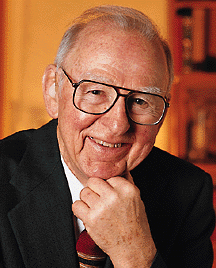 Edwin G. Krebs
Edwin G. Krebs
 Edwin G. Krebs
Edwin G. Krebs
Edwin G. Krebs is a soft-spoken, understated Midwesterner, but there's one thing that gets his goat. Since he turned his attention from medicine to biochemistry, people have been asking him about "his" cycle. They confuse him with Sir H.A. Krebs, the British scientist who won the Nobel Prize in 1953 for elucidating the metabolic Krebs (or tricarboxylic acid) cycle.
One person who made this mistake was the chairman of a clinical department at the UW School of Medicine in 1948, when Krebs started as an assistant professor of biochemistry.
"I must confess that I didn't correct his wrong impression," says Krebs. "I was so uneasy about my status then that I enjoyed being treated with such deference, even for the wrong reason."
In 1992, Krebs and Edmond H. Fischer were awarded the Nobel Prize in physiology or medicine for figuring out how reversible phosphorylation works as a switch to activate proteins and regulate various cellular processes.
Their discovery was a key to unlocking how glycogen in the body breaks down into glucose. It fostered techniques that prevent the body from rejecting transplanted organs. Their breakthrough also opened new doors for research into cancer, blood pressure, inflammatory reactions and brain signals.
"One of the things that went through my mind when we won was that I wouldn't have to answer that cycle question again," says Krebs. "But people still congratulate me for having `my' cycle recognized--and think it took till 1992 for that to happen."
It took till three days after the prize was announced for Krebs to think of asking about how much money would be involved.
"Ed and I invited our extended families and paid the way for those who needed it," he says of the Stockholm ceremonies. Krebs and Fischer donated the remaining money to educational, medical and arts institutions, including "a little" to the UW biochemistry and pharmacology departments. "Easy come, easy go," says Krebs.
Looking at the world today, Krebs is disappointed that the goal of becoming a scientist--or even of getting an education--is becoming less accessible to poor children: "I would like to see a day when any kid would be able to go as far as his abilities could carry him," he says. "In many ways, the situation for young people seems worse now than when I graduated."
As UW professor emeritus and Howard Hughes Medical Institute senior investigator emeritus, Krebs still leads an active lab. But it's down from 20 to five lab people, who are all now looking elsewhere. "I hope to close my lab in a year," he says.
George Hitchings, 1988 Prize in Medicine
Hans Dehmelt, 1989 Prize in Physics
E. Donnall Thomas, 1990 Prize in Medicine
Edmond Fischer, 1992 Prize in Medicine
Martin Rodbell, 1994 Prize in Medicine
Return to the Beginning of "After the Prize"
Send a letter to the editor at columns@u.washington.edu.